Who is in the Classroom? Collaborating with Classroom Professionals
 Try
Try
Take a few minutes at the top of the class to check in with all Classroom Professionals, sharing expectations for activities and how they can support you and the students.
 Learn
Learn
All of the adults’ names and their roles in the classroom.
 Try
Try
Offer moments of leadership to Classroom Professionals to model or lead a small group.
Remote Teaching and Learning Tip:
You may also encounter additional support and caregivers while working on digital platforms. Engaging your support team on digital platforms can require additional preparation and tactics. To learn more, check out our resource for Who Is in the Virtual Classroom? Online Collaboration With Classroom Professionals.
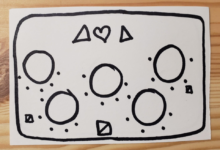
Image Credit: Adriana Guzman
Play #1
This model is recommended for a team that is excited to facilitate with you, but has not reviewed your lesson closely.
In this model, both Teachers join you in facilitating your lesson. This is an ideal model if you find yourself with Teachers who demonstrate an interest in being involved during your pre-residency planning meeting.
- You still carry most of the content sharing, demonstration, and instructional part of the lesson.
- Then invite specific Teachers to take the lead at different moments, by demonstrating as models, clarifying or translating, writing directions on chart paper or a board, distributing materials, grouping students, documenting, leading cleanup, etc.
- Paraprofessionals with individual students can focus on supporting them with the lesson, and the Classroom Paraprofessional can float between students who need support.
- The Teachers can bounce off of you and add additional guidance. You all work the room and address potential student needs that may arise.
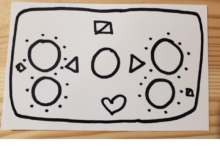
Image Credit: Adriana Guzman
Play #2
This model is recommended for a team that has time to review the lesson plan beforehand.
In this model, you deliver enough of the lesson to get started, then one Teacher works with half the class and the second Teacher works with the other half, using the same lesson for each group.
- You will take on the role of the floater and provide support if needed, or observe, document, or fill any other need.
- Then continue to deliver instructions or check in with the entire class during particular periods of the lesson.
- Paraprofessionals with individual students can focus on supporting them within their groups, and the Classroom Paraprofessional can float alongside you.
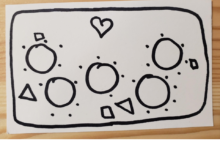
Image Credit: Adriana Guzman
Play #3
This model is recommended for a team that has not had much time to review the lesson plan beforehand and is less enthusiastic about participating.
In this model, you will be the lead educator; Teachers will take on the roles of assisting or observing.
- As the lead, you will present and facilitate the lesson.
- One Teacher will be your assistant, supporting you in transmitting information and instructions, and answering any questions that may arise.
- The second Teacher will be the observer, taking notes during discussions, or photographing the lesson as well as observing the level of student engagement and providing support if needed.
- Paraprofessionals with individual students can focus on supporting them with the lesson, and the Classroom Paraprofessional can float among individual students who need assistance as well as support the Teaching Artist.
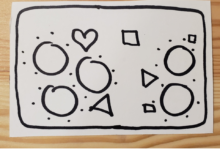
Image Credit: Adriana Guzman
Play #4
This model is recommended for a team that has not had much time to review the lesson plan beforehand.
In this model, after you introduce the lesson, the Special Ed Teacher will add specific strategies for some students to work on the lesson, and then focus on working with those students.
- Your role is to work with the remainder of the students.
- The General Education Teacher will assist you and can provide extension activities for students who may need them.
- Paraprofessionals with individual students can focus on supporting them with the lesson, and the Classroom Paraprofessional can float among individual students who need assistance.
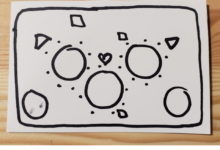
Image Credit: Adriana Guzman
Play #5
This model is recommended for a team that has time to review the lesson plan beforehand, and is hands-on with their students and your art form, or a class that would benefit from small-group work.
In this model, you and the Classroom Professionals work with your own small groups.
- Since the Classroom Teachers have familiarity with their students, they facilitate breaking up the room into three or four groups and assign an Educator to each group.
- Each Educator delivers the lesson to their group and is responsible for the lesson and the group for the duration of the session. In these groups, students may complete an entire lesson, or could rotate between Educators. You may want to provide written instructions for each Educator to follow. Alternatively, you could first go over the directions as a full group before breaking into small groups.
- The Classroom Paraprofessional can float among all three groups or lead a fourth group.
- Paraprofessionals with individual students can focus on supporting them with the lesson in their group.

